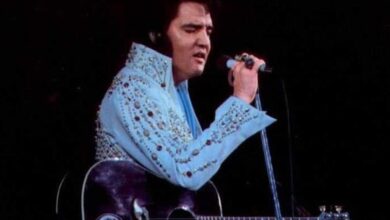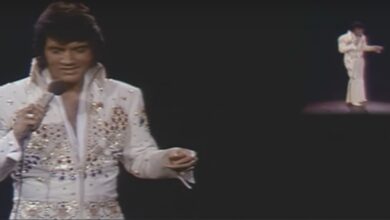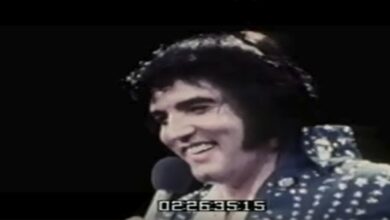After 42 years, the same magic remains. His perfect performance is still incredible
“You Don’t Have to Say You Love Me,” originally recorded by Dusty Springfield in 1966, became a classic of the era with its poignant lyrics and soulful delivery. The song tells the story of unrequited love and the bittersweet acceptance of a relationship’s end, capturing a universal sentiment that resonated deeply with listeners. Dusty Springfield’s version, characterized by its powerful vocals and dramatic orchestration, solidified its place as one of her signature songs, earning acclaim for its emotional depth and authenticity.
Elvis Presley’s rendition of “You Don’t Have to Say You Love Me” in 1970 showcased his ability to reinterpret and infuse new meaning into established hits. Known for his dynamic range and expressive voice, Elvis approached the song with a more stripped-down arrangement compared to Springfield’s orchestral version. Backed by acoustic guitars and subtle orchestration, his rendition emphasized the intimacy and vulnerability of the lyrics, while still retaining the song’s emotional core.
The live performance of “You Don’t Have to Say You Love Me” during Elvis’s concerts in 1970 captured the essence of his stage presence and vocal prowess. His emotive delivery conveyed the song’s longing and heartache, resonating with audiences who appreciated his ability to connect on a personal level through music. Elvis’s interpretation of the song reflected his matured artistic sensibilities at the time, blending his rock and roll roots with a more introspective approach that suited the song’s melancholic themes.
Throughout his career, Elvis Presley was renowned for his versatility as a vocalist, effortlessly transitioning between rockabilly, gospel, blues, and ballads. His ability to adapt songs to his own style while maintaining their essence was a hallmark of his artistic approach. “You Don’t Have to Say You Love Me” stands as a testament to his interpretative skills and his knack for making each song uniquely his own.
Born on January 8, 1935, in Tupelo, Mississippi, Elvis Aaron Presley rose to fame in the mid-1950s with his groundbreaking recordings at Sun Studio in Memphis. Hits like “Heartbreak Hotel,” “Hound Dog,” and “Love Me Tender” catapulted him to international stardom, earning him the title of the “King of Rock and Roll.” Beyond his musical achievements, Elvis became a cultural icon whose influence extended beyond music into film and fashion.
Despite his early success, Elvis faced personal challenges throughout his life, including the pressures of fame, health issues, and struggles with addiction. Nevertheless, his passion for music remained a constant throughout his career. His live performances, including his rendition of “You Don’t Have to Say You Love Me,” became showcases of his evolving artistry and emotional depth, demonstrating his ability to captivate audiences with both his voice and stage presence.
Elvis’s legacy continues to endure decades after his passing in 1977, with his music continuing to inspire and resonate with new generations of listeners. His impact on popular culture is immeasurable, and his influence on the development of rock and roll remains profound. Songs like “You Don’t Have to Say You Love Me” highlight Elvis Presley’s enduring talent and his ability to transcend musical genres, leaving an indelible mark on the history of music.
In conclusion, Elvis Presley’s live performance of “You Don’t Have to Say You Love Me” in 1970 exemplifies his ability to interpret and elevate a song with his distinctive voice and emotive delivery. His rendition of this classic reflects his musical maturity and remains a poignant reminder of his lasting impact on the world of music and beyond.



